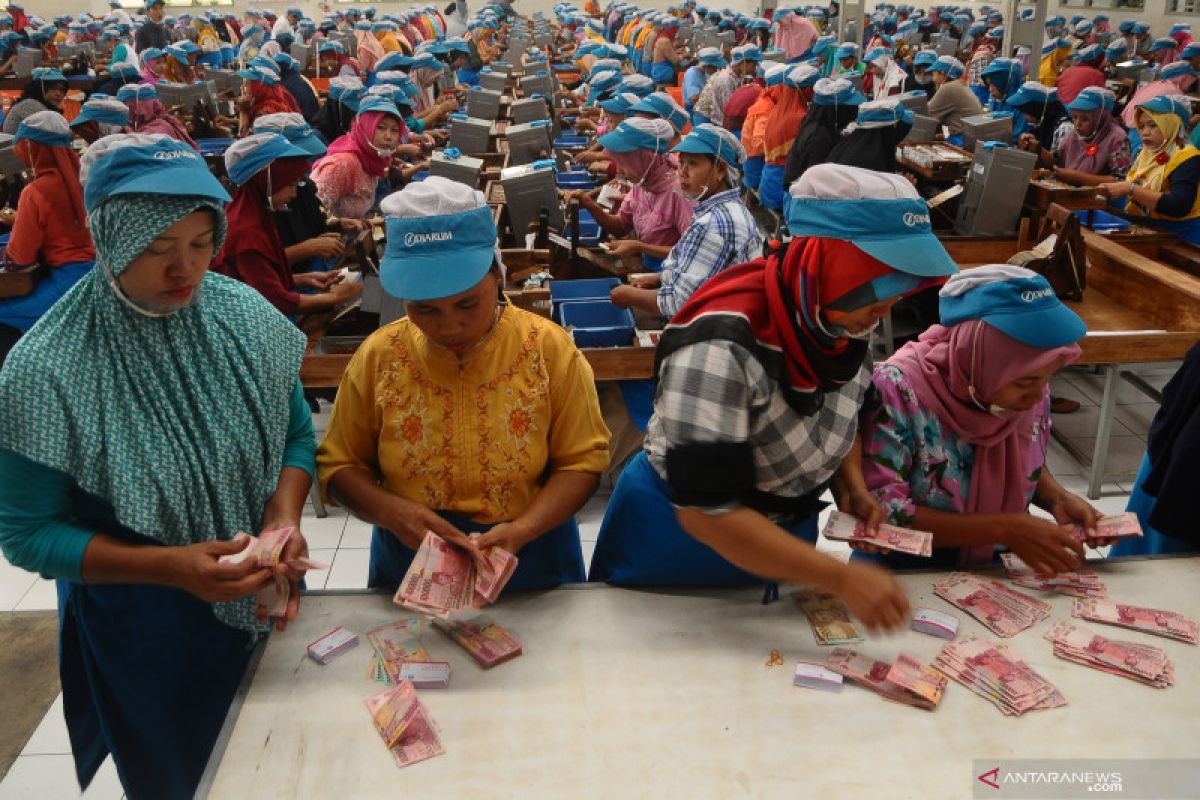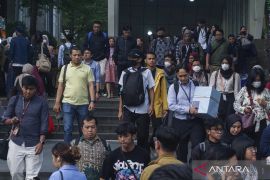The mother of five has been doing this work since the past 12 years. She had stopped work in 2013, as her machine stopped working after her place got flooded. However, Murhayati had restarted work in 2017 and been doing it until now.
Leading a prosperous life was not the reason behind Muhayati returning to being a freelance worker but her enthusiasm to lend a helping hand to her husband to support the family's finances had made her endure this condition.
"We need recognition. This is since all this time, it has remained unknown, and there is no protection for our work," Muhayati pointed out.
Sewing work in the absence of a clear-cut employment contract results in freelance workers, such as Muhayati, oftentimes suffering losses rather than earning profits.
She revealed that for 10 dozen baby gloves and socks sewn, she only received a minimum salary of Rp30 thousand. She also had to replace them in case of any defect in the seams.
No less miserable is the plight of other freelance home workers engaged in the footwear sector. They earn Rp300 per shoe and can finish preparing 40 to 50 shoes per day. However, in the event of a mistake, these home workers are required to replace around Rp14 thousand per shoe.
"There is no holiday as such. If we need to send the goods, we will continue to be inundated with work. We can even work 24 hours. Ironically, our existence is not recognized by the company that employs us," she pointed out.
Despite a waste of energy, the houses of these workers become "factories" and "warehouses" for the goods coming in.
Not astonishingly, their homes becomes flooded with items piling up, and this undeniably poses a hindrance for other family members.
Moreover, the workers have to independently bear the costs of electricity, water, and all supporting facilities.
Muhayati remarked that until now, the company had paid wages to home workers through intermediaries in charge of at least 15 such workers.
"I also currently have my own sewing machine and pay for the electricity expenses reaching around Rp80 thousand to Rp120 thousand in a month," she remarked.
Work accidents are another cause of concern. With no contractual agreements in employment, they cannot avail health insurance.
"If an accident occurs, for instance, I get hurt by a sewing needle and it is bleeding, they do not want to know. If it's gluey, the smell of glue is also dangerous. Hence, usually we turn on the fan to get rid of the smell in the house. There are more chances of catching a cold, as it constantly gets windy," she remarked.
Hence, these workers are seeking acknowledgment in future for their work.
"This is since this work done from their homes remains hidden. We have a supply chain entailing companies and intermediaries, among others. Particularly pertaining to social security, we demand that the government immediately stop businesses that do not respect the rights of home workers," she stated.
Labor Issues
The Trade Union Rights Center Informal Work Advocacy Coordinator Dede Rina stated that the reach of labor-intensive industries in Indonesia is always restricted to the emergence of new labor issues.
Rina noted that labor-intensive industries rely on cheap labor in large numbers to win competition in the free market era.
"This makes labor-intensive industries lower the production costs using a scheme that transfers the production processes to home-scale industries to streamline the production expense ratio," Rina pointed out.
The contribution of home workers can be viewed from three aspects: working on products obtained from the factories, helping in completing products ordered by the employer and until the work is done in each house through an intermediary.
"Home workers are often equated with self-employed workers or MSMEs. In fact, home workers have a working relationship with employers that covers wages, orders, target time, quality, quantity, and other provisions that can be said to be almost the same as factory workers," he remarked.
For entrepreneurs, mobilizing home workers in labor-intensive production chains is indeed lucrative. In addition to efficiency in production costs, these workers also aid in expediting the completion of production, expanding production creations, and so on.
However, these conditions are reversed with those experienced by workers, as they continue to receive wages below the minimum level, face occupational and health safety hazards, and are susceptible to workplace accidents that not only threaten them but also their families.
"Hence, we demand that the government act promptly to protect home workers through the Home Workers Protection Ministerial Regulation," Rina noted.
It also demanded that the government offer employment and social protection to home workers and end business practices that fail to respect human rights.
Furthermore, the government must soon offer greater access to decent work for home workers.
EDITED BY INE
Editor: Fardah Assegaf
Copyright © ANTARA 2019












